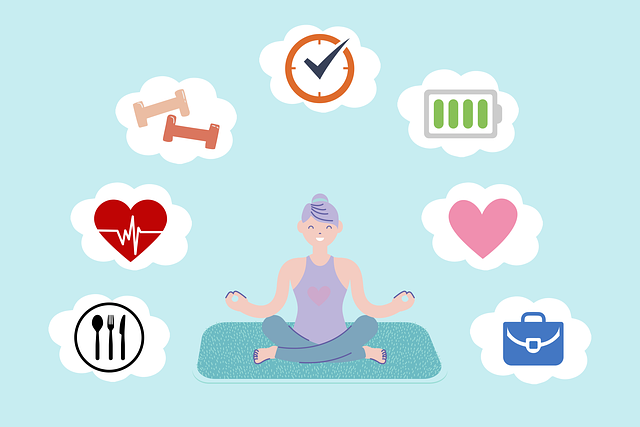Arvada Couples Counseling Therapy emphasizes understanding group dynamics for effective mental wellness support. Facilitators create safe spaces by actively listening, fostering empathy, and respecting diverse backgrounds. Structured agendas, icebreakers, and risk management planning enhance engagement and well-being. Continuous evaluation through assessment tools ensures tailored interventions and positive change, benefiting participants and promoting public awareness.
“Unleash the power of collective healing with effective mental wellness group facilitation. This comprehensive guide, inspired by Arvada Couples Counseling Therapy, delves into the art of nurturing supportive communities. From understanding intricate group dynamics to implementing strategies for meaningful discussions, we explore proven techniques. Learn how to create a safe space, enhance engagement, and measure success in promoting mental wellness through group interactions. Discover the impact of facilitated groups in fostering profound personal growth.”
- Understanding Group Dynamics for Effective Facilitation
- Strategies to Foster a Safe and Supportive Environment
- Techniques to Guide Productive Group Discussions
- Measuring and Enhancing Mental Wellness Outcomes in Group Settings
Understanding Group Dynamics for Effective Facilitation

Understanding group dynamics is a cornerstone for effective facilitation, especially in contexts like Arvada Couples Counseling Therapy where fostering a supportive and engaging environment is paramount. Groups are complex ecosystems, with each member bringing unique experiences, perspectives, and emotional states. Recognizing power dynamics, individual personalities, and the overall mood of the group allows facilitators to navigate interactions, ensuring everyone feels heard and respected. This involves actively listening, mediating conflicts, and cultivating an inclusive atmosphere that encourages open communication.
Effective facilitation also entails recognizing the stage of development where the group is, whether it’s forming, storming, norming, or performing. Tailoring activities and discussions accordingly facilitates the emotional healing processes and promotes emotional well-being. Moreover, incorporating techniques from Risk Management Planning for Mental Health Professionals can help mitigate potential challenges, ensuring a safe space that enhances, rather than hinders, the group’s progress.
Strategies to Foster a Safe and Supportive Environment

Creating a safe and supportive environment is paramount when facilitating mental wellness groups, especially in settings like Arvada Couples Counseling Therapy. This involves cultivating an atmosphere where every participant feels seen, heard, and respected. Facilitators should encourage active participation while ensuring confidentiality to foster trust. Techniques such as active listening, open-ended questioning, and reflective summarizing allow for deeper engagement and create a sense of belonging.
Cultural sensitivity in mental healthcare practice plays a significant role here. Understanding the diverse backgrounds and beliefs within the group ensures inclusive practices. Incorporating conflict resolution techniques promotes healthy interactions and positive thinking among members. By facilitating constructive dialogue, facilitators can help individuals navigate differences, fostering a supportive network that enhances overall mental wellness.
Techniques to Guide Productive Group Discussions

Guiding productive group discussions is a nuanced art that facilitators at Arvada Couples Counseling Therapy master to create safe and supportive environments. One effective technique involves setting clear ground rules, ensuring every participant feels heard and respected. This includes establishing open communication protocols, encouraging active listening, and fostering an atmosphere of empathy and non-judgment. By doing so, members feel empowered to share their experiences and insights without fear of criticism or rejection.
Additionally, facilitators should employ structured agendas that allow for a logical flow of topics. Incorporating icebreakers and group activities can help build camaraderie and trust, making it easier to delve into more profound conversations about emotional healing processes and conflict resolution techniques. Integrating these strategies not only enhances engagement but also aids in the risk assessment for mental health professionals, ensuring the well-being of both the facilitators and participants.
Measuring and Enhancing Mental Wellness Outcomes in Group Settings

Measuring mental wellness outcomes is crucial in group settings, as it allows facilitators like those at Arvada Couples Counseling Therapy to understand the impact and effectiveness of their interventions. Various assessment tools can be employed to gauge improvements in symptoms, coping strategies, and overall well-being. These assessments should be tailored to the specific needs and goals of the group, ensuring relevance and accuracy. Regular feedback from group members is also invaluable; facilitators can collect qualitative data through open discussions or anonymous surveys to gain insights into individual experiences and collective progress.
By analyzing these metrics, facilitators can refine their approaches, incorporating effective communication strategies and tailoring activities to address emerging needs. Public awareness campaigns development and burnout prevention initiatives within the group setting can further enhance mental wellness outcomes. This continuous evaluation and adaptation ensure that the group environment remains supportive and conducive to positive change, benefiting all participants.
Group facilitation plays a pivotal role in enhancing mental wellness, as evidenced by effective practices like those employed by Arvada Couples Counseling Therapy. By understanding group dynamics, creating safe spaces, and employing strategic discussion techniques, facilitators can significantly improve outcomes. Measuring these outcomes ensures accountability and allows for continuous enhancement, making group settings powerful tools for nurturing mental health and well-being.














